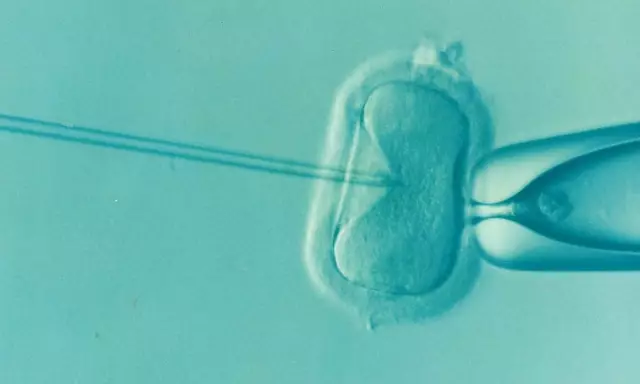- Author Rachel Wainwright wainwright@abchealthonline.com.
- Public 2023-12-15 07:39.
- Last modified 2025-11-02 20:14.
7 interesting facts about IVF
IVF (in vitro fertilization) is a method of treating infertility, which at one time caused a huge number of broken copies, because the people who worked on its creation were accused no less of competing with God. Today, almost no one denies the right of IVF to exist, and “test-tube babies” are not surprising either. Nevertheless, there is some magic in the procedure of artificial insemination: the process of the birth of a new life is always a mystery, and even now it is not fully solved. We bring to your attention a selection of interesting facts related to in vitro fertilization.
The first successful IVF procedure was performed in 1977
For the first time IVF, which ended in a successful childbirth, was carried out in 1977, and the first attempt was made in the 17th century. Humanity has been struggling for a long time to translate this idea into reality: three centuries of searching for a solution to the problem of infertility and tireless attempts to object to fate - is this not persistence? It simply could not fail to be rewarded.

Source: depositphotos.com
Louise Brown is the first child born after IVF
On July 25, 1978, the most sensational baby in the history of mankind was born - the first test-tube baby. This happened in England, Leslie and John Browns became happy parents, and the child was named Louise. She was the most ordinary newborn girl, and as she grew, she turned out to be no better or worse than others, and this was again a discovery: the assumption was confirmed that children born as a result of IVF do not create any special problems, they are the same as everyone else, and have exactly the same right to exist. Louise's own sister, Natalie, was also artificially conceived and also became famous. Natalie Brown is the first test-tube baby to have a naturally conceived baby.

Source: depositphotos.com
6 million babies were born thanks to IVF
To date, 6 million successful in vitro fertilization operations have been performed. Just think: 6 million people got the right to life thanks to scientists and doctors! This is more than the entire population of, for example, a country like Denmark.

Source: depositphotos.com
The optimal age for IVF is up to 40 years
The most suitable age for IVF is 25-40 years. It is noted that after 40 years, the effectiveness of the attempts being made drops rapidly, and after 43 years it reaches a minimum. However, even here artificial insemination pushes the boundaries of the possible. The oldest woman who was able to become pregnant using the IVF procedure, and subsequently successfully bear and give birth (and even twins - a girl and a boy) is Omkari Panwar from India. It happened in 2008, at that time she was 70 years old, and her happy father was 77.

Source: depositphotos.com
There is a ban on choosing the sex of the child
The reason that Omkari Panwar at such a respectable age decided on artificial insemination was a strong desire to have a son, although she already had two daughters and even five grandchildren.
Currently, it is forbidden to choose the sex of the child during IVF: this is considered unethical, and in those countries where the birth of a child of a certain gender, due to cultural traditions, is much more desirable than the birth of a child of the opposite sex, it can lead to serious demographic problems. Doctors allow only one exception - these are cases when inherited pathology can be associated with gender.

Source: depositphotos.com
Not all IVF attempts lead to pregnancy
It is a misconception that artificial insemination is 100% effective. Success is achieved in about 35% of IVF attempts, and a number of successful procedures end in spontaneous abortion. In most cases, IVF is resorted to by women with health problems, which partly explains such indicators. It should be remembered that in absolutely healthy people, far from 100% of attempts to conceive a child in a natural way end in pregnancy.

Source: depositphotos.com
IVF is more successful in the warm season
An explanation for this has not yet been found, but the fact remains - IVF attempts carried out in spring and summer are more often successful, which is convincingly confirmed by the collected statistics.

Source: depositphotos.com
YouTube video related to the article:

Maria Kulkes Medical journalist About the author
Education: First Moscow State Medical University named after I. M. Sechenov, specialty "General Medicine".
Found a mistake in the text? Select it and press Ctrl + Enter.






